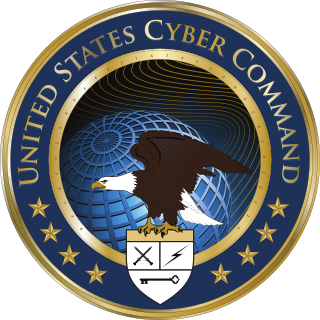Related Research Articles
Computer and network surveillance is the monitoring of computer activity and data stored locally on a computer or data being transferred over computer networks such as the Internet. This monitoring is often carried out covertly and may be completed by governments, corporations, criminal organizations, or individuals. It may or may not be legal and may or may not require authorization from a court or other independent government agencies. Computer and network surveillance programs are widespread today and almost all Internet traffic can be monitored.
Freedom of the press or freedom of the media is the fundamental principle that communication and expression through various media, including printed and electronic media, especially published materials, should be considered a right to be exercised freely. Such freedom implies the absence of interference from an overreaching state; its preservation may be sought through the constitution or other legal protection and security. It is in opposition to paid press, where communities, police organizations, and governments are paid for their copyrights.

The United States Agency for Global Media (USAGM), known until 2018 as the Broadcasting Board of Governors (BBG), is an independent agency of the United States government that broadcasts news and information. It is considered an arm of U.S. diplomacy.
Internet censorship in Tunisia significantly decreased in January 2011, following the ouster of President Zine El Abidine Ben Ali, as the new acting government removed filters on social networking sites such as YouTube.
Center for Democracy & Technology (CDT) is a Washington, D.C.–based 501(c)(3) nonprofit organisation that advocates for digital rights and freedom of expression. CDT seeks to promote legislation that enables individuals to use the internet for purposes of well-intent, while at the same time reducing its potential for harm. It advocates for transparency, accountability, and limiting the collection of personal information.
Censorship in South Korea is implemented by various laws that were included in the constitution as well as acts passed by the National Assembly over the decades since 1948. These include the National Security Act, whereby the government may limit the expression of ideas that it perceives "praise or incite the activities of anti-state individuals or groups". Censorship was particularly severe during the country's authoritarian era, with freedom of expression being non-existent, which lasted from 1948 to 1993.
In the United States, censorship involves the suppression of speech or public communication and raises issues of freedom of speech, which is protected by the First Amendment to the United States Constitution. Interpretation of this fundamental freedom has varied since its enshrinement. Traditionally, the First Amendment was regarded as applying only to the Federal government, leaving the states and local communities free to censor or not. As the applicability of states rights in lawmaking vis-a-vis citizens' national rights began to wane in the wake of the Civil War, censorship by any level of government eventually came under scrutiny, but not without resistance. For example, in recent decades, censorial restraints increased during the 1950s period of widespread anti-communist sentiment, as exemplified by the hearings of the House Committee on Un-American Activities. In Miller v. California (1973), the U.S. Supreme Court found that the First Amendment's freedom of speech does not apply to obscenity, which can, therefore, be censored. While certain forms of hate speech are legal so long as they do not turn to action or incite others to commit illegal acts, more severe forms have led to people or groups being denied marching permits or the Westboro Baptist Church being sued, although the initial adverse ruling against the latter was later overturned on appeal to the U.S. Supreme Court case Snyder v. Phelps.
In the United States, internet censorship is the suppression of information published or viewed on the Internet in the United States. The First Amendment of the United States Constitution protects freedom of speech and expression against federal, state, and local government censorship.
The print, broadcast and online mass media in Burma has undergone strict censorship and regulation since the 1962 Burmese coup d'état. The constitution provides for freedom of speech and the press; however, the government prohibits the exercise of these rights in practice. Reporters Without Borders ranked Burma 174th out of 178 in its 2010 Press Freedom Index, ahead of just Iran, Turkmenistan, North Korea, and Eritrea. In 2015, Burma moved up to 144th place, ahead of many of its ASEAN neighbours such as Singapore, as a result of political changes in the country.

Censorship is the suppression of speech, public communication, or other information. This may be done on the basis that such material is considered objectionable, harmful, sensitive, or "inconvenient". Censorship can be conducted by governments, private institutions, and other controlling bodies.

Freedom of speech is the concept of the inherent human right to voice one's opinion publicly without fear of government censorship or punishment. "Speech" is not limited to public speaking and is generally taken to include other forms of expression. The right is preserved in the United Nations Universal Declaration of Human Rights and is granted formal recognition by the laws of most nations. Nonetheless, the degree to which the right is upheld in practice varies greatly from one nation to another. In many nations, particularly those with authoritarian forms of government, overt government censorship is enforced. Censorship has also been claimed to occur in other forms and there are different approaches to issues such as hate speech, obscenity, and defamation laws.

Michael H. Posner is an American lawyer, the Founding Executive Director and later the President of Human Rights First, the former Assistant Secretary of State for Democracy, Human Rights, and Labor (DRL) of the United States, currently director for the Center of Business and Human Rights at NYU Stern School of Business, as well as Professor of Business and Society at New York University Stern School of Business, and a board member of the International Service for Human Rights.

Freedom of speech is a principle that supports the freedom of an individual or a community to articulate their opinions and ideas without fear of retaliation, censorship, or legal sanction. The right to freedom of expression has been recognised as a human right in the Universal Declaration of Human Rights and international human rights law by the United Nations. Many countries have constitutional law that protects free speech. Terms like free speech, freedom of speech, and freedom of expression are used interchangeably in political discourse. However, in a legal sense, the freedom of expression includes any activity of seeking, receiving, and imparting information or ideas, regardless of the medium used.

United States Cyber Command (USCYBERCOM) is one of the eleven unified combatant commands of the United States Department of Defense (DoD). It unifies the direction of cyberspace operations, strengthens DoD cyberspace capabilities, and integrates and bolsters DoD's cyber expertise which focus on securing cyberspace.

The National Defense Authorization Act for Fiscal Year 2010 is a law in the United States signed by President Barack Obama on October 28, 2009. As a bill it was H.R. 2647 in the 111th Congress. The overall purpose of the law is to authorize funding for the defense of the United States and its interests abroad, for military construction, and for national security-related energy programs.
Intellectual freedom encompasses the freedom to hold, receive and disseminate ideas without restriction. Viewed as an integral component of a democratic society, intellectual freedom protects an individual's right to access, explore, consider, and express ideas and information as the basis for a self-governing, well-informed citizenry. Intellectual freedom comprises the bedrock for freedoms of expression, speech, and the press and relates to freedoms of information and the right to privacy.
There is medium internet censorship in France, including limited filtering of child pornography, laws against websites that promote terrorism or racial hatred, and attempts to protect copyright. The "Freedom on the Net" report by Freedom House has consistently listed France as a country with Internet freedom. Its global ranking was 6 in 2013 and 12 in 2017. A sharp decline in its score, second only to Libya was noted in 2015 and attributed to "problematic policies adopted in the aftermath of the Charlie Hebdo terrorist attack, such as restrictions on content that could be seen as 'apology for terrorism,' prosecutions of users, and significantly increased surveillance."
Freedom of expression in Canada is protected as a "fundamental freedom" by section 2 of the Canadian Charter of Rights and Freedoms; however, in practice the Charter permits the government to enforce "reasonable" limits censoring speech. Hate speech, obscenity, and defamation are common categories of restricted speech in Canada. During the 1970 October Crisis, the War Measures Act was used to limit speech from the militant political opposition.
The National Defense Authorization Act (NDAA) for Fiscal Year 2013 is a United States federal law which specifies the budget and expenditures of the United States Department of Defense for fiscal year 2013. The full title is An Act to Authorize Appropriations for fiscal year 2013 for military activities of the Department of Defense, for military construction, and for defense activities of the Department of Energy, to prescribe military personnel strengths for such fiscal year, and for other purposes. This law has been assigned the number PL 112–239.
The Connecticut Four are librarians who filed a lawsuit known as Doe v. Gonzales, challenging the constitutional validity of National Security Letters (NSL) issued by the Federal Bureau of Investigation (FBI) under the USA PATRIOT Act.
References
- 1 2 "Secretary of State Clinton on Internet Freedom". America.gov. 2010-01-21. Retrieved 2011-09-15.
- ↑ "Letter from the President regarding Victims of Iranian Censorship Act | The White House". whitehouse.gov . 2010-04-01. Archived from the original on 2017-02-16. Retrieved 2011-09-15– via National Archives.